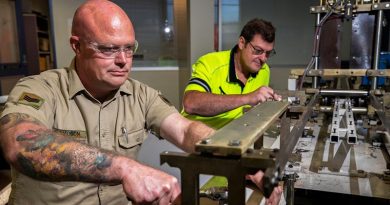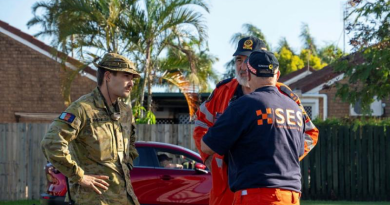Expensive, long-winded trial to study what should be CDF
Share the post "Expensive, long-winded trial to study what should be CDF"

No one – even Veterans’ Affairs Minister Darren Chester – argues that Therapy Dogs wouldn’t be of benefit to veterans suffering PTSD or other service-related mental-health issues.
But, rather than getting on with any rollout of a therapy-dog program, Mr Chester has instead announced a multi-year, multi-million-dollar university trial, just to determine which breed of dog might be most suitable.
Minister for Veterans’ Affairs Darren Chester announced the trial today.
“I am pleased to announce that DVA has engaged La Trobe University, in partnership with the Centre for Service and Therapy Dogs Australia, to undertake the trial of assistance dogs for veterans with PTSD as a supplement to clinical treatment,” Mr Chester said.
“La Trobe is a leader in research involving our best friend and is the home to Australia’s first dedicated human-dog interaction laboratory.
“Dogs are great company, good fun and loyal friends, and anyone who has had a dog knows they can be incredibly beneficial for your wellbeing.”
Despite all these benefits – and a shed-load of expert experiences, evidence, advice, knowledge, anecdotes and ‘CDF’ [or command dog f*@k, as they say in the military] in this field – Mr Chester still felt a $2-million study to delay real action was warranted.
“The trial will be a considered process that takes into account the specific needs of the participating veteran such as determining the most appropriate breed and temperament of dog, and the bonding process between the dog and participant.”
Mr Chester said work would commence on the detailed design phase of the trial, including the process for veteran recruitment – but veteran candidates won’t even be recruited to the trial until next year, with dog or puppy selection taking place after that.
“Following the matching and suitability process, there will be a period of approximately 18 months for the initial dog training and the bonding process, prior to the placement of the dog with the participant on a permanent basis,” Mr Chester said.
In other words, the results of this trial and any subsequent rollout of dogs to veterans (if it ever happens), will be well into next decade at least.
“It is expected that up to 20 participants will take part in the trial,” Mr Chester said.
“Unlike pet or companion dogs, assistance dogs are specially trained to perform ‘tasks’ that contribute to the clinical recovery goals of the individual [a well-known fact not being tested in this trial].
“The assistance dog will be integrated as part of a clinical-care plan involving the veteran and their mental health clinician.
“Of course, throughout this trial, the welfare and safety of the veterans and of the dogs will be paramount” [but non-participating veterans will receive none of the proven benefits that assistance dogs can offer].
La Trobe Deputy Vice-Chancellor Keith Nugent said that the university, in consultation with DVA, veteran mental health and industry experts, would establish and apply best practice protocols to guide the training, selection and monitoring of participants and assistance dogs.
“This world-first approach to assisting people with PTSD will see our researchers working alongside industry experts in assistance-dog training,” Professor Nugent said.
“Our students and staff will also play an integral role in this process.
“We expect this project to make a meaningful difference to the lives of our veterans.”
Mr Chester claimed the assistance-dog trial was just one of the new initiatives to strengthen the Turnbull Government’s commitment to veterans’ mental health and wellbeing.
“This trial involving DVA and La Trobe University will include consultation and the active participation of veterans through the design and delivery of this program” [sorry, but isn’t this a trial involving just 20 veterans – not ‘a program’].
Mr Chester (who is extremely unlikely to still be Vet Affairs Minister (if even in government) when this trial ends) claimed the government was putting veterans and their families at the centre of everything they did, and this trial was an important tool in its efforts to support those who have served our nation in uniform.
.
.
.
.
.
.

.
.
Share the post "Expensive, long-winded trial to study what should be CDF"






What utter BS to conduct a trial on assistance dogs for Veterans. It disgusts me that time and $2M is the Minister’s priority instead of doing the bleeding obvious and allocate dogs with Veteran’s NOW. It’s not rocket science that dogs are wonderful therapy, and enough study and/or proof has already been established.
Back in the day, when I did Aged Care Nursing, dogs, cats and even birds were provided for the elderly. Thank-you for your patience while I vent my spleen. Rant over.
This editorial comes across as ignorant. Scientific research is rarely wasted.
It’s CDF!? So are rifles but we don’t just give our frontline units lee enfields anymore so we? CDF would say as a rifle it could kill the enemy, it’s been shown to work plenty of times. However, research development and study has led to vastly superior weaponry and even which “breed” of weapon is suited to task, we have multiple in service weapons.
We even train our troops how to use hen and Zero our weapons so we get the best effect from our investment.
Handing out dogs might be short term fix but with research in the long run expenditure will not only be more justified but each dollar is going to have a greater impact on helping veterans.
Besides up until 1983 PTSD wasn’t even a recognised mental disorder worthy of treatment or research and CDF!! Up until early last century saw men affected by “shell shock” as weak and mentally defective and regularly shot for desertion.
So maybe science and peer reviewed research might be a bit more or platform to build off clinical practice and aiding our veterans than “hey PTE bloggs has a dog and he seems happy.”
Maybe?
I have a dog, Miss Penny, a six year old Dachsund who is my mate and never leaves my side.
Who needs credentials?
Cav